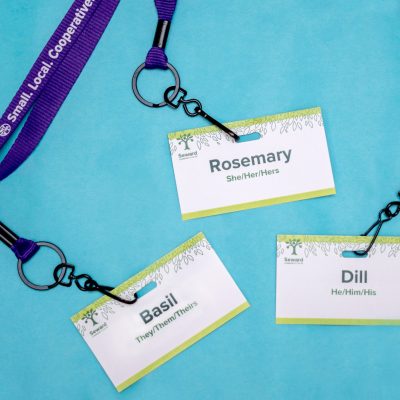Search Results
New Seward Co-op Website
Seward Co-op’s Annual Owner Meeting
October 22, 2019 @ 6:00 pm - 8:00 pm
Join us on Tuesday, October 22, at the Annual Co-op Owners Meeting as we recognize and understand the vital role of Hmong American farmers and Hmong culture in our local food system. Share a meal full of Hmong flavors designed by Chef Yia Vang and learn how Hmong American farmers are organizing to access land, markets, capital, research and training so that they can build intergenerational and community wealth. Our featured speaker is Pakou Hang, Co-Founder and Executive Director of the Hmong American Farmers Association (HAFA), a membership based non-profit organization that was created in 2011 to lift up Hmong American farmers and their families.
We will also share the results of the board of directors election, and announce SEED recipients for 2020, including the results of our second Community Choice SEED vote!
Tickets are $5 in advance or $15 at the door.
Children (5-12): $3; Children 4 and under are free.
Everyone Welcome: Gender Inclusion at Seward Co-op
At Seward Co-op, we are committed to a culture of inclusion where everyone feels welcome, respected and celebrated. As part of this commitment, we are asking staff, owners and customers to use gender-inclusive and affirming language. As part of this effort, you may notice some new signage in the stores and at the café. The signs simply say:
“If you are unsure of someone’s pronouns, please use gender-neutral language and/or a person’s name when talking to them. We appreciate you!”
What do we mean by “Gender Inclusive?”
Using gender-inclusive language is one way that we can show respect and avoid making assumptions. For example, instead of using gendered language such as “ladies,” “gentlemen,” “sir” or “ma’am,” try instead using phrases like: “Good morning, folks!” or “Thanks, friend.” Personal pronouns (words like she, her, he, him, they and them) can be tricky in the English language because their use—whether correct or incorrect— can reflect assumptions about a person’s gender expression. Making an assumption about someone’s pronouns can feel disrespectful and hurtful. If you’re not sure about someone’s pronouns at the co-op, just use that person’s name or change your sentence a little bit.
For example, instead of: “Thanks for the recipe suggestion, Sam! (turning to person next to you) He always has a recipe for each new veggie in season.”
Try this: “Thanks for the recipe suggestion, Sam! (turning to person next to you) Sam always has a recipe for each new veggie in season.”
Co-op staff have ongoing relationships with both co-workers and community members—so it often makes sense to share our pronouns and/or ask others which pronouns they use. When someone shares their pronouns with you, please use those pronouns. Again, this is a way to show respect.
If you make a mistake and misgender someone, apologize, move on, and do better next time. If you’d like to learn more about why this is important, read tips on sharing and asking about pronouns or find other resources, www.mypronouns.org is a great place to start.
Seward Co-op’s Role in Community Crisis
Concern for Community is a Co-op Principle, Sustaining a Healthy Community is Our Mission
Our community and our nation are facing crises of opioid use and homelessness and they’re showing up at Seward Co-op. Focused on community-based solutions, Seward Co-op has joined forces with Twin Cities area co-ops, St. Stephen’s Human Services and the Minnesota Department of Health. Our approach is centered on harm reduction and restorative justice.
Seward Co-op’s Ends Statement calls us to sustain a healthy community. Concern for community is an international cooperative principle. Both underline everything we do. “Everyone Welcome” is posted at the entrances of each of our locations. We remain committed to welcoming everyone into the co-op community. How does this take shape when Minnesota experiences record levels of homelessness and Hennepin County a 50-percent uptick in deaths related to opioid use?
Staff leaders at Seward Co-op are committed to addressing common misconceptions. These issues have affected individuals throughout the co-op community, including our employees, shoppers and neighbors. A Wilder Research survey says substance use and homelessness don’t always go hand in hand. About 20 percent of people experiencing homelessness are also experiencing a substance use-related issue. At all Seward Co-op locations, we have seen an increase in people who sign near the entrances and we’ve also seen increased indications of opioid use. But, we treat them as what they are: separate issues that at times overlap.
Employees have received training to compassionately handle behaviors we’ve noticed. At each of our locations, we’re having conversations with individuals who may be experiencing a particular issue or a combination of issues. We focus on individual well-being and specific cases, offering resources when necessary and fairly enforcing co-op policies. We avoid making assumptions about a person’s journey and ask community members to do the same.
We don’t want to presume what community members need. Instead, we look to existing community-driven, community-based solutions. When we hear the needs of folks with lived experience, together we can advocate for systemic change. While Seward Co-op is a community-owned enterprise, fundamentally we are a food business. So, we rely on the experts. Co-op leadership is working with local nonprofits and the Minnesota Department of Health to provide support to our staff and neighbors. We’re also collaborating with area co-ops on a united approach to both improve and raise awareness of crises facing our communities.
There are things that we can do as individuals that create collective impact. Round up for SEED grant recipients throughout the year or make a direct contribution to a social services organization of your choice. Advocate for social and policy changes that address underlying issues. MN Coalition for the Homeless is a statewide effort to advance policy initiatives that lead to housing stability for all Minnesotans. The coalition has a robust 2019-2020 legislative agenda, titled Homes for All, supported by more than 200 area organizations. Learn more about 2019 outcomes and get involved at www.mnhomelesscoalition.org.
Please join us in creating a safe and welcoming space for all. We’ve heard from many people about their experience at our stores and see many of you already committed to this work. We appreciate you and welcome your input at seward.coop/contactus.
Seward Co-op is a community of more than 20,000 owners. Only together can we realize our mission of sustaining a healthy community that has equitable economic relationships; positive environmental impacts; and inclusive, socially responsible practices.
Resources related to housing, addiction and mental illness:
- The Homes for All website has extensive resources including a legislative agenda for 2019-2020, reports, factsheets and advocacy tools: homesforallmn.org. Homes for All is endorsed by more than 245 area organizations, including St. Stephens Human Services (mentioned above) and some of those below.
- National Alliance on Mental Illness Minnesota offers ways to get involved, including influencing legislation and public policies that affect the lives of those living with mental illness: namimn.org.
- Downtown Congregations to End Homelessness is an interfaith collaboration of 17 downtown Minneapolis churches, synagogues and mosques working together to end homelessness and poverty: www.dceh.org.
- One of DCEH’s specific programs is Street Voices of Change, which elevates the voice of people experiencing homelessness so all are equal partners in shaping the current experience of homelessness and ending it in the future: www.dceh.org/svoc/
- JustUs Health offers support to people from diverse gender, sexual, and cultural communities in risk reduction, assistance, health & wellness, and peer support. (Formed in 2018 by the joining of Minnesota AIDS Project and Rainbow Health Initiative.) www.justushealth.org
- Valhalla Place is a premier provider of addiction and mental health services in the Twin Cities, and via their Brainerd, MN office: valhallaplace.com
- The Steve Rummler Hope Network heightens awareness of the disease of addiction through providing critical education and training on overdose prevention: steverummlerhopenetwork.org
Seward-made Fall Menu
 Seward Co-op’s production kitchen is cooking up Fall favorites. Here are some highlights of what you’ll find in our stores:
Seward Co-op’s production kitchen is cooking up Fall favorites. Here are some highlights of what you’ll find in our stores:
•Lentil, Squash, and Parsnip Salad (vegan & made without gluten)
•Pumpkin Cake with Cream Cheese Frosting (made without gluten)
•Vegan Macaroni & Cheese (vegan)
•Wheat Berry Apple and Pecan Salad
Sausage
Greek Loukaniko—Loukaniko is the word for sausage in Greek. Our Greek Loukaniko is fresh and made with lamb and pork from Community Foods producer Peterson’s Meats, along with leeks, orange juice and wine giving it a slight tartness. Greek Loukaniko is excellent grilled, pan fried, sautéed or topped on pizza with peppers herbs and feta!
Chicken Wild Rice with Blueberry—Enjoy a punch of fall flavors with this chicken sausage! Made with chicken from Community Foods producer Kadejan, wild rice, ginger, parsley, rosemary, white peppercorn, nutmeg, and dried blueberries. Great with breakfast eggs and hashbrowns, quiche or some roasted veggies!
Thai Chicken Sausage—Thai Chicken is made with garlic, shallots, fish sauce, cilantro, lemongrass, galangal, turmeric, shrimp paste, salt, black peppercorn, makrut lime leaf and chicken from Community Foods producer, Kadejan. Use it to add some heat to stir-fry, soup or sticky rice.


